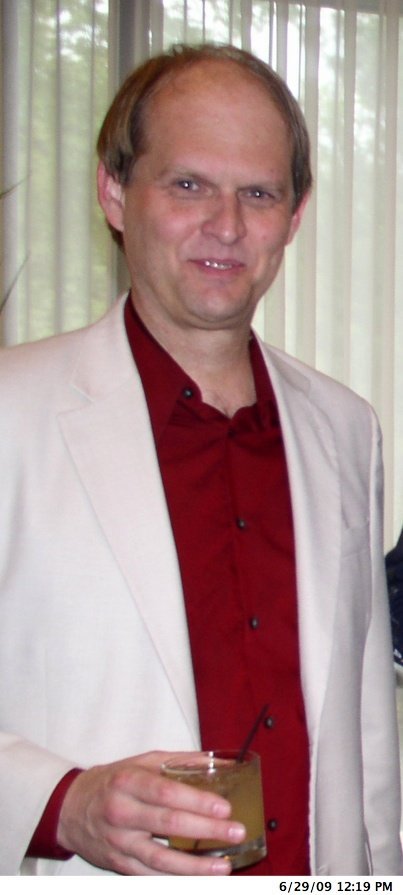Robin Hanson‘-s auto-biography (i.e., how Our Master Of All Universes views HimSelf):
–
Do you find it hard to summarize yourself in a few words? Me too.
But I love the above quote. I have a passion, a sacred quest, to understand everything, and to save the world. I am addicted to a€?viewquakesa€?, insights which dramatically change my world view. I loved science fiction as a child, and have studied physics, philosophy, artificial intelligence, economics, and political science a€” all fields full of such insights. Unfortunately, this also tempted me to leave subjects after mastering their major insights.
I also have a rather critical style. I beat hard on new ideas, seek out critics, and then pledge my allegiance only to those still left standing. In conversation, I prefer to identify a claim at issue, and then focus on analyzing it, rather than the usual quick tours past hundreds of issues. I have always asked questions, even when I was very young.
I have little patience with those whose thinking is sloppy, small, or devoid of abstraction. And Ia€™m not a joiner– I rebel against groups with a€?our beliefsa€?, especially when members must keep criticisms private, so as not to give ammunition to a€?them.a€?A I love to argue one on one, and common beliefs are not important for friendship a€” instead I value honesty and passion.
In a€?77 I began college (UCI) in engineering, but switched to physics to really understand the equations.A Two years in, when physics repeated the same concepts with more math,A I studied physics on my own, skipping the homework but acing the exams.A To dig deeper, I did philosophy of science grad school (U Chicago), switched back to physics, and was then seduced to Silicon Valley.
By day I did artificial intelligence (Lockheed, NASA), and by night I studied on my own (Stanford) and hung with Xanadua€™s libertarian web pioneers and futurists.A I had a hobby of institution design– my best idea was idea futures, now know as prediction markets. Feeling stuck without contacts and credentials, I went for a Ph.D. in social science (Caltech).
The physicist in me respected only econ experiments at first, but I was soon persuaded econ theory was full of insight, and did a theory thesis, and a bit of futurism on the side.A I landed a health policy postdoc, where I was shocked to learn of medicinea€™s impotency.A I finally landed a tenure-track job (GMU), and also found the wide-ranging intellectual conversations Ia€™d lacked since Xanadu.
My Policy Analysis Market project hit the press shit fan in a€?03, burying me in media attention for a while, and helping to kickstart the prediction market industry, which continues to grow and for which I continue to consult.A The press flap also tipped me over the tenure edge in a€?05- my colleagues liked my being denounced by Senators. ![]() A Tenure allowed me to maintain my diverse research agenda, and to start blogging at Overcoming Bias in November a€?06, about the same time I became a research associate at Oxforda€™s Future of Humanity Institute.
A Tenure allowed me to maintain my diverse research agenda, and to start blogging at Overcoming Bias in November a€?06, about the same time I became a research associate at Oxforda€™s Future of Humanity Institute.
My more professional bio is here.
–
Robin Hanson is an associate professor of economics at George Mason University, and a research associate at the Future of Humanity Institute of Oxford University. After receiving his Ph.D. in social science from the California Institute of Technology in 1997, Robin was a Robert Wood Johnson Foundation health policy scholar at the University of California at Berkeley. In 1984, Robin received a masters in physics and a masters in the philosophy of science from the University of Chicago, and afterward spent nine years researching artificial intelligence, Bayesian statistics, and hypertext publishing at Lockheed, NASA, and independently.
Robin has over 70 publications, including articles in Applied Optics, Business Week, CATO Journal, Communications of the ACM, Economics Letters, Econometrica, Economics of Governance, Extropy, Forbes, Foundations of Physics, IEEE Intelligent Systems, Information Systems Frontiers, Innovations, International Joint Conference on Artificial Intelligence, Journal of Economic Behavior and Organization, Journal of Evolution and Technology, Journal of Law Economics and Policy, Journal of Political Philosophy, Journal of Prediction Markets, Journal of Public Economics, Medical Hypotheses, Proceedings of the Royal Society, Public Choice, Social Epistemology, Social Philosophy and Policy, Theory and Decision, and Wired.
Robin has pioneered prediction markets, also known as information markets or idea futures, since 1988. He was the first to write in detail about people creating and subsidizing markets in order to gain better estimates on those topics. Robin was a principal architect of the first internal corporate markets, at Xanadu in 1990, of the first web markets, the Foresight Exchange since 1994, and of DARPA’-s Policy Analysis Market, from 2001 to 2003. Robin has developed new technologies for conditional, combinatorial, and intermediated trading, and has studied insider trading, manipulation, and other foul play. Robin has written and spoken widely on the application of idea futures to business and policy, being mentioned in over one hundred press articles on the subject, and advising many ventures, including Consensus Point, GuessNow, Newsfutures, Particle Financial, Prophet Street, Trilogy Advisors, XPree, YooNew, and undisclosable defense research projects.
Robin has diverse research interests, with papers on spatial product competition, health incentive contracts, group insurance, product bans, evolutionary psychology and bioethics of health care, voter information incentives, incentives to fake expertize, Bayesian classification, agreeing to disagree, self-deception in disagreement, probability elicitation, wiretaps, image reconstruction, the history of science prizes, reversible computation, the origin of life, the survival of humanity, very long term economic growth, growth given machine intelligence, and interstellar colonization.


